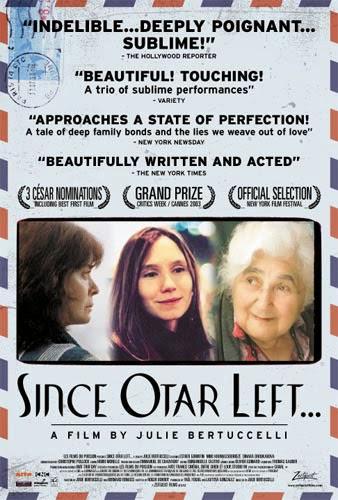
Released 17 September 2003
Jim, A filmmaker acquaintance of mine, recently recommended Since Otar Left (2003) to me, so I moved it to the top of my viewing list. The fact that it won the Critics Week Grand Prize at Cannes the year it was released certainly didn't dissuade me from viewing it.Let me start with the end: I bawled for a good twenty minutes when the movie concluded. It gave me a greater appreciation for the strengths that older adults often possess -- but that others often fail to acknowledge.
I don't want to spoil the movie. Just rent it. I will tell you that it's an art house film. The pacing is slow, and the significant details are more subtle. It contains an essence of realism, in my opinion, mimicking the way most of us experience life in small details that become significant through reflection.
In an effort to retain the film's power, my review has to be a bit vague. Let me just draw your attention to a few aspects of the film.
First, the setting is primarily in Tbisili, George--part of the former Soviet Union. The characters speak a mixture of Russian, Georgian, and French. I watched it with subtitles.
The most important element of the film is the complex dynamic among these three women and to a certain extent a handful of men connected to them (including the titular Omar).
The three principal characters are middle aged Marina, her young adult daughter Ada, and her aging mother Eka. The grandmother of this trio is played by actress Esther Gorintin, who turned 90 the January before the film was released.
These three live in the same house, and they are struggling to get by financially and emotionally. Eka has the additional challenges of an aging body to manage. Eka's daughter and granddaughter offer her as much support as their resources allow. As the film progresses, the spotlight moves from one woman to the other, showing how each views life and how each connects with the other.
These three have several conflicts to manage, but the most overtly stated problem deals with helping the grandmother keep in contact with her son who emigrated to France. I would ask viewers to note all the issues in the film, big and small. About halfway through I realized that the problem of Otar wasn't really the only significant challenge.
Homes in my country (the US) may not have as many intergenerational household, but I still think the film offers insight on how to regard family members. Filmmaker Julie Burtuccelli certainly exposed some of my misconceptions. That's why I was crying so hard by the end; I got schooled.
But enough said. If you are interested in multigenerational households or life in Georgia or the challenges and opportunities of late life, rent Since Otar Left.
Related:
Films about Aging

